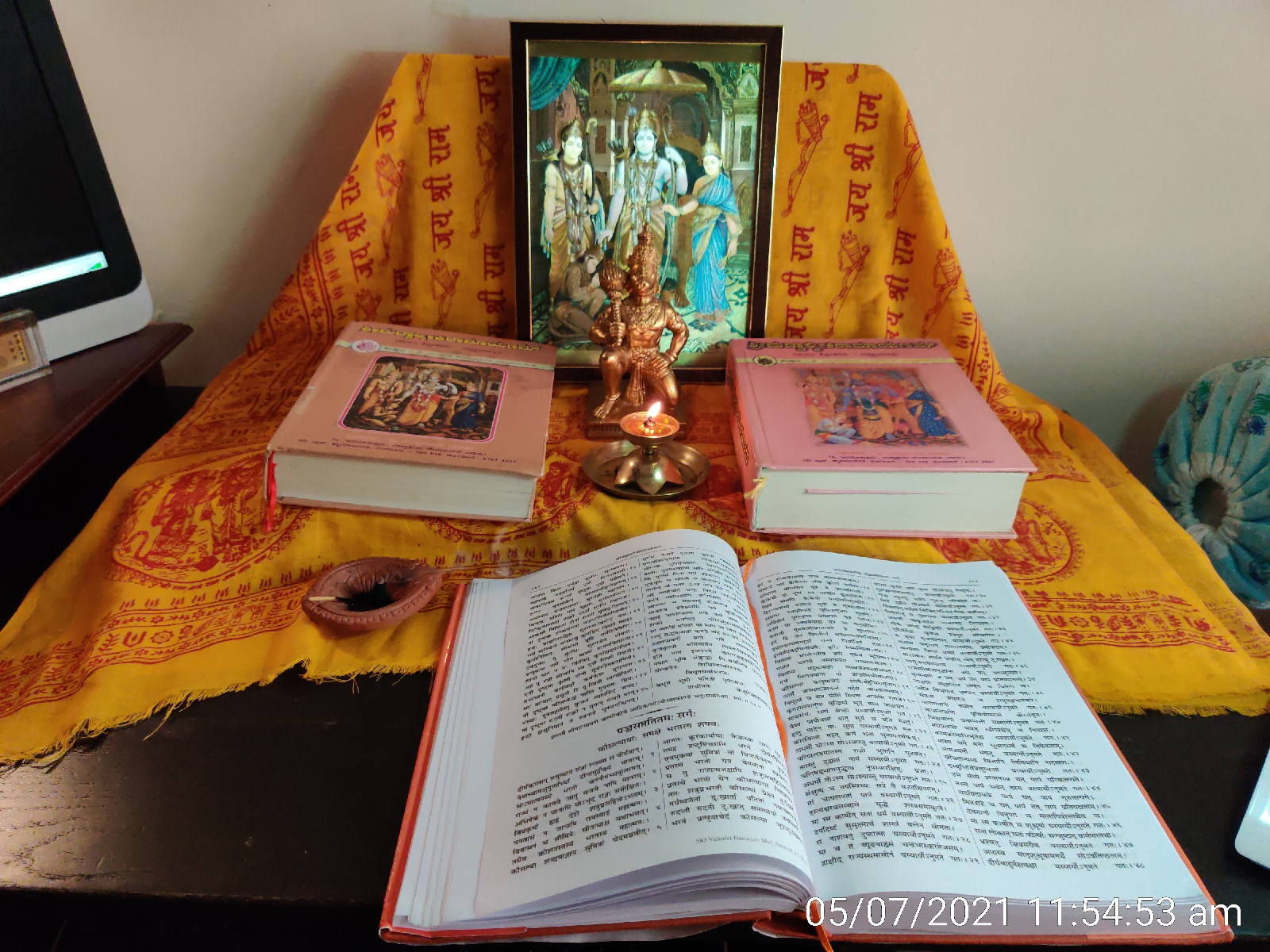July 5 - Sargas 75 and 76 of Ayodhya Kanda.
Bharata meets Kausalya. Miserable and shrunken in sorrow, she suggests that Bharata must be very happy to take over the throne. Bharata is hurt so much that he goes out of his way to clear his name.
Then they perform Dasharatha's last rites.
***
When Bharata recovers, he again speaks harshly to Kaikeyi at her despicable act. He tells the ministers present that he has no intention of taking the throne. He wants to go and meet Kausalya.
Hearing the noises and voices, Kausalya has gathered that Bharata is back. She walks with Sumitra towards Kaikeyi's chambers to meet him. Midway they encounter Bharata and Shatrughna. Kausalya looks in a terrible state as she embraces Bharata. Then she says something expected:
कामं वा स्वयमेवाद्य तत्र मां नेतुमर्हसि ।
यत्रासौ पुरुषव्याघ्रस्तप्यते मे सुतस्तपः ॥
इदं हि तव विस्तीर्णं धनधान्यसमन्वितम् ।
हस्त्यश्वरथसम्पूर्णं राज्यं निर्यातितं तया ॥
"Dear Bharata, perhaps you should yourself take me now to the forest, where my son, a tiger among men, is performing tapas.
"This large kingdom is now all yours, made rich with grain and fortune of all kinds, abounding in an army with elephants, horses, and chariots. It has been delivered to you by your mother (on a silver platter as they say now). "
Imagine Bharata's chagrin when he realises that Kausalya thinks he is a party to Kaikeyi's sinful act. The personality of Bharata comes out loud and clear as he protests most vehemently that he is being imputed motives of sin by Kausalya.
Poet Valmiki says that Bharata swears and curses in unmitigated indignation that whosoever might be responsible for Sri Rama's banishment should suffer the consequences. This type of cursing is common even today when someone wants to clear his character from public mistrust or accusations of mala fides.
Bharata curses that whoever is responsible for sending away Sri Rama to the forest should suffer the most terrible retribution. This goes on for more than forty shlokas! All of them use the expression यस्यार्योऽनुमते गतः - "one by whose order the noble Sri Rama has been exiled." The shlokas are very colourful descriptions of transgressions, indulgences, errors of omission, adharmic acts, crimes, sins of all sorts - towards people, towards one's family, towards society at large, towards Brahmins and sages, and even egregious acts that destroy one's own life. I give just three examples :
बलिषड्भागमुद्धृत्य नृपस्यारक्षितुः प्रजाः ।
अधर्मो योऽस्य सोऽस्यास्तु यस्यार्योऽनुमते गतः ॥
"May that blighter by whose order the noble Sri Rama has been exiled incur the same sin as a king who has collected taxes at the rate of one-sixth of income from his citizens but does not discharge his responsibilities towards ensuring their protection and welfare." (Yes, that is the income tax rate mentioned in many scriptures!)
गाः स्पृशतु पादेन गुरून् परिवदेत च ।
मित्रे द्रुह्येत सोऽत्यर्थं यस्यार्योऽनुमते गतः ॥
"May that blighter by whose order the noble Sri Rama has been exiled incur the same sin of transgression as one who kicks a cow, insults his gurus, and betrays his friends."
पुत्रदासैश्च भृत्यैश्च स्वगृहे परिवारितः ।
स एको मृष्टमश्नात् यस्यार्योऽनुमते गतः ॥
"May that blighter by whose order the noble Sri Rama has been exiled incur the same sin as a householder, living with children, wife, servants, and attendants, who does not share his lavish meal with them but instead eats them secretly alone."
More than anything else, we discover the temperament of Bharata. I am sparing you many other colourful analogies that we may find difficult to relate to in our times!
Kausalya is contrite that she misunderstood the nature and calibre of her son Bharata and bracketed him with Kaikeyi. Just as she is making amends, sage Vasishtha walks in. He says that the last rites of king Dasharatha are pending and that they should be performed with due ceremony and no further discussion.
The servants bring the dead king from the oil bath and clean the corpse and decorate it elaborately after placing it on a regal bed. Bharata wails uncontrollably seeing his dead father. They then prepare the bier and carry the king in a royal procession through the main street of Ayodhya amid much wailing and mourning by one and all.
Finally, the king is cremated with all due honours by the priests. Bharata, Shartughna, and the queens, including Kausalya, Sumitra and Kaikeyi, pay their last respects to the departed monarch.
The funeral ceremonies are not very different from what is ritualistically observed even today.
***
॥ श्रीरामजयम् ॥
